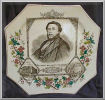



The Sermons of
Charles Haddon Spurgeon
1834-1892
Charles Haddon Spurgeon's original manuscript sermons:
The first of Spurgeon's sermons to be published was one preached at New Park Street Chapel on August 20, 1854: "Is it not wheat harvest today?" This sermon sold well [in the Penny Pulpit] and others were published both in that series and in the Baptist Messenger. Joseph Passmore, a member of New Park Street Chapel, with whom Spurgeon formed a friendship the first day he preached in London, suggested that his publishing firm undertake the weekly publication of Spurgeon's sermons. The first to be published was that of January 7, 1855 and his sermons were published weekly not only through the rest of his ministry, but many years beyond his death. The weekly sermons were first printed in small type in eight pages, but the abolition of the duty on paper enabled the publishers to expand the format to 12 pages. Yearly volumes followed; first the New Park Street Pulpit and then, after its construction, the Metropolitan Tabernacle Pulpit.
As Spurgeon did not write out his sermons, but rather preached from very brief notes [a facsimile of notes for a sermons on Luke II. 10-12 is found on page 69 of volume IV of his Autobiography (London: Passmore & Alabaster, 1900)], there was a need for a professional shorthand writer's to take down the sermon as preached if anything was to be published. This was done, through most of his ministry not only for the Sunday morning sermons, but for those he preached both Sunday and Thursday evenings as well. These latter two were held in reserve and the sermon preached Sunday morning was the one regularly printed week by week.
In order to accomplish this weekly publication, the 'reporter' who had taken down the sermon transcribed it into manuscript form and the result (usually some 40 to 50 pages) was delivered to Spurgeon the same day. Very occasionally when he was to be away on Monday he was compelled to revise the sermon before going to bed, but ordinarily this was his first work on Monday morning. This was no mere correction of minor detail, but involved extensive amendment. Thus not only words are replaced, but sentences, paragraphs and even pages. His wife characterizes it as "always a labour of love, yet...a labour...." The weekly sermon had to be ready in the hands of his publishers and printed by Thursday morning and he was not willing that it should represent anything less than his best ["up to the highest mark", as his wife phrases it]. The task was greater if he had to lengthen or reduce it, as each sermon had to fill 12 pages. When the revisions were completed (usually the sermons went, by messenger, to Passmore & Alabaster in 2 or even 3 segments), galleys were produced and returned for further correction. These were more extensive when the sermon needed to be lengthened or shortened, but there were always further corrections and at least minor amendments made. Sometimes a second set of galleys was required and occasionally a third. When the work was finally completed the sermon went to press and distribution was begun Thursday morning. This process was repeated weekly through Spurgeon's ministry.
There were, of course, exceptions to this routine. When he was ill or away on holiday he did not preach. Yet sermons were required without intermission. This need was filled by the revision and publication of the manuscripts from either the Sunday or Thursday evening services. Sometimes Spurgeon revised the manuscript, but frequently these were put into print in galley format without prior revision and then sent to Spurgeon. These galleys received extensive correction and revision and commonly there were not one but two further galley proofs before the sermon went to press. These were sometimes readied for the press in advance of actual need, though more often they seem to have been done on an ad hoc basis, sometimes the revision being done while Spurgeon was on holiday at Mentone, in France.
**************************************
The material currently offered for sale is, first and most important, a number of the original scribal manuscripts, mostly those from Sunday morning delivered to Spurgeon later that day, carefully and extensively corrected and amended by Spurgeon in his own hand and then conveyed to Passmore & Alabaster, his publishers, and put by them into a printed galley format. Each of these sermons is accompanied by a matching set of galleys, as delivered to Spurgeon and, for the most part, carefully corrected and amended by him; most of the galleys seem to be the first state, with substantial corrections throughout. A small number seem to be a second state, with minimal correction. A few of the sermons are accompanied by two sets of galleys.
 A book box has been [or will be] made to house each sermon. If the box has not already been made for a given sermon the color of the morocco can be selected by the purchaser. Cloth folders will be provided to house the (very much larger) matching galleys.
A book box has been [or will be] made to house each sermon. If the box has not already been made for a given sermon the color of the morocco can be selected by the purchaser. Cloth folders will be provided to house the (very much larger) matching galleys.
Each sermon, of course, is unique. Though the final printed version is available to all the world and is indeed still in print, these manuscripts with their accompanying galleys represent, first, the original sermon as Spurgeon delivered it to the congregation and, also, two stages of extensive corrections and revisions, all in his own hand. As such they provide an unparalleled insight into the work of a master preacher.
In a certain sense this could be conceived of as an opportunity to own one of a limited edition of Spurgeon's sermons, substantially in his hand. But in reality each is one of a kind, with no other like it in the world. There is no printed version of any of the sermons as Spurgeon preached them; all of the printed versions are as he amended them. Thus the basic text is unique. Then too these are the closest thing to a manuscript sermon in Spurgeon's hand as is possible to obtain, as he did not write out his sermons before they were preached. The extensive nature of the corrections and revisions means that perhaps a third or more of each sermon is in Spurgeon's own hand.
A unique opportunity. Priced between $20,000 and $30,000 per sermon, each with its matching set of galleys, with the exact price depending on both the length of the sermon [they average a bit over 45 pages, though some are under 40 and some over 60] and the Scripture text treated. Quantity discounts are available.
********
There are also some manuscript sermons, corrected and amended by Spurgeon, but without galleys. A fair number of these are lacking a page or two [often the last page]. All will be housed in a book box like the one pictured. Prices for these will vary according to the number of pages and the Scripture text treated and also, particularly, according to whether or not the sermon is complete. Sermons lacking a page or two will generally be priced between $6000. and $10,000. Complete sermons will generally be between $10,000. and $15,000. Again, quantity discounts are available.
In addition to the above there are nearly 80 manuscript sermons, exactly representing the sermon as preached, but without any revision or correction by Spurgeon. A bit over half have a matching galley, some of which have extensive corrections by Spurgeon.
Please inquire if interested.






